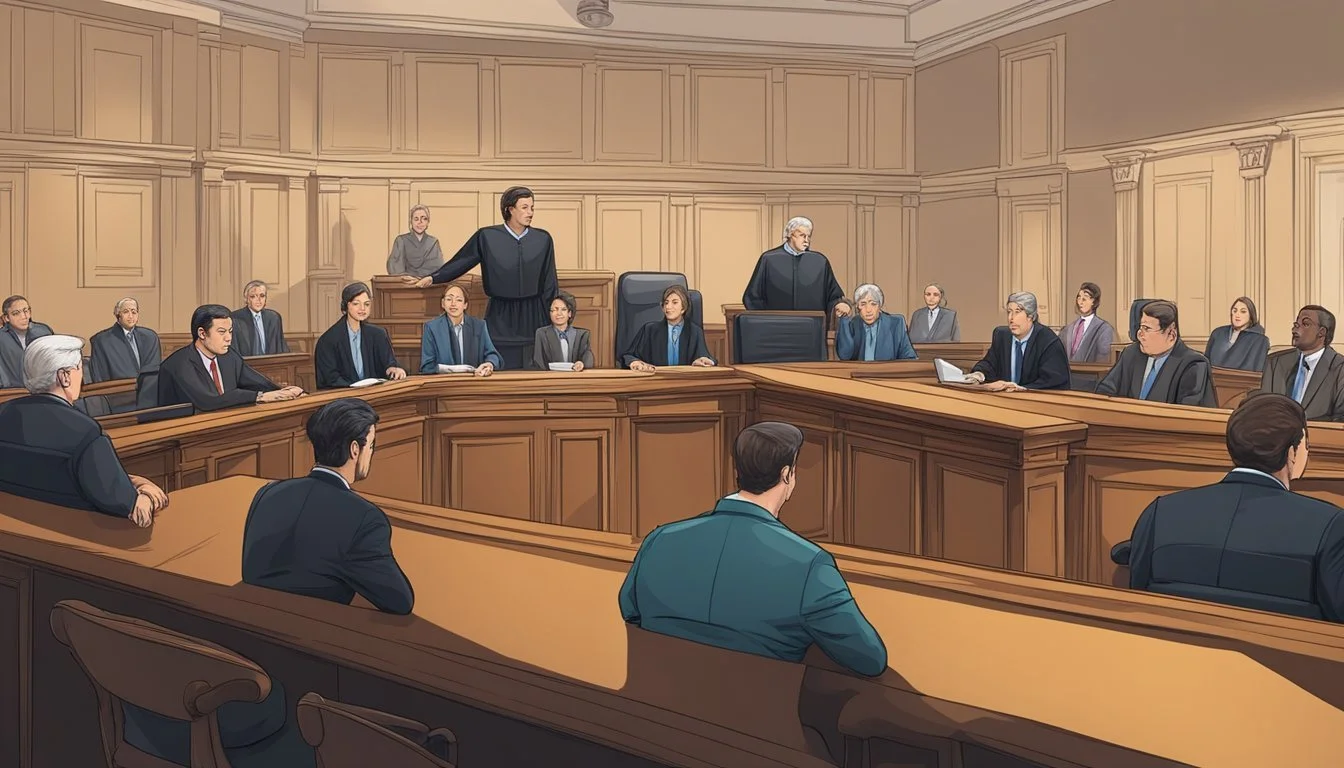Is Steven Hobbs, Texas Killing Fields Suspect, Still Awaiting Trial?
Latest Update on High-Profile Case
Steven Hobbs, a former security guard, emerged as a suspect in the notorious Texas Killing Fields cases years after the initial murders occurred. He was arrested in 2011 for a series of sexual assaults and murders of women in Harris County, Texas, spanning nearly a decade.
After spending over 11 years in Harris County Jail as the longest-serving inmate, Steven Hobbs pleaded guilty to his confirmed crimes in 2022, avoiding a trial and receiving a life sentence. This development brought a measure of closure to some of the victims' families and law enforcement officials who had been pursuing justice for years.
The Texas Killing Fields cases, involving numerous unsolved murders along the I-45 corridor, garnered renewed attention with Hobbs' arrest. While he was never formally charged with the earlier Killing Fields murders, investigators explored potential connections between those cases and Hobbs' known crimes. The resolution of Hobbs' case marked a significant chapter in the ongoing efforts to solve the complex web of crimes associated with the Texas Killing Fields.
Background of Steven Hobbs
Steven Alexander Hobbs, born on February 23, 1971, worked as an armed security guard in Harris County, Texas. He became a suspect in multiple sexual assaults and murders of women in the area between 2002 and 2011.
Early Life and Employment
Little is known about Hobbs' early life. He pursued a career in security, obtaining employment as an armed security guard in Harris County. This position gave Hobbs access to various locations and the authority to carry a weapon. His work as a security guard allowed him to move freely throughout the area, potentially providing opportunities for criminal activities.
Identification as a Suspect
Hobbs came under suspicion for a series of crimes against women, particularly sex workers, in Harris County. Investigators linked him to multiple sexual assaults and at least two murders between 2002 and 2011. His identification as a suspect came after a decade-long investigation into these crimes.
Law enforcement connected Hobbs to the murders of Sara Sanford and Patricia Pyatt. He was accused of beating and strangling Pyatt before dumping her body in the San Jacinto River in 2002. The evidence gathered against Hobbs led to his arrest and subsequent legal proceedings.
The Texas Killing Fields
The Texas Killing Fields refers to a desolate area along Interstate 45 between Houston and Galveston that gained notoriety as the dumping ground for numerous murder victims. This stretch of land has been linked to over 30 unsolved cases dating back to the 1970s.
Geographic Profile
The Texas Killing Fields encompasses a 50-mile stretch of land along I-45, characterized by marshy terrain and dense vegetation. This area includes parts of Galveston County and extends towards the San Jacinto River. Its remote location and difficult-to-access spots made it an ideal place for criminals to dispose of bodies.
The proximity to major highways allowed perpetrators easy entry and exit points. The terrain's challenging nature often hindered search efforts and evidence collection, contributing to the high number of unsolved cases in the region.
History of Unsolved Crimes
Since the 1970s, the Texas Killing Fields has been associated with a series of gruesome discoveries. Over 30 bodies, primarily young women and girls, have been found in this area. The first documented case dates back to 1971, with victims continuing to be discovered through the following decades.
Many of these crimes remain unsolved, baffling law enforcement for years. The cases often involve similar patterns: young women who disappeared and were later found murdered in the area. Despite extensive investigations, the lack of physical evidence and the passage of time have complicated efforts to solve these crimes.
Law enforcement agencies have explored potential connections between the cases, considering the possibility of a serial killer or multiple offenders operating in the area. The enduring mystery of the Texas Killing Fields continues to haunt investigators and victims' families alike.
Chronology of Crimes
Steven Hobbs' criminal activities spanned nearly a decade, targeting multiple victims in Harris County, Texas. His crimes escalated from sexual assaults to murders, with some victims surviving to provide crucial testimony.
Early Victims
Patricia Pyatt fell victim to Hobbs in 2002. He assaulted and murdered her, marking the beginning of his known criminal spree. In 2010, Wanda Trombley became another casualty. Her body was discovered, linking Hobbs to a second murder. These early crimes established a pattern of violence against women in the area.
Hobbs targeted sex workers, exploiting their vulnerability. He used his position as a security guard to approach victims, often in isolated areas. The murders of Pyatt and Trombley went unsolved for years, allowing Hobbs to continue his attacks.
Captured Living Victims
Some of Hobbs' victims survived his assaults. These women provided critical information to law enforcement. Their testimonies helped build a case against Hobbs and revealed his modus operandi.
One survivor reported being kidnapped and assaulted by Hobbs in 2011. She managed to escape and later identified him. Another victim came forward with a similar story, strengthening the evidence against him.
These living victims played a crucial role in Hobbs' eventual arrest. Their accounts exposed the full extent of his crimes, including sexual assaults and attempted murders. Their bravery in coming forward helped bring Hobbs to justice and potentially saved future victims.
The Legal Proceedings
Steven Alexander Hobbs faced a complex legal journey spanning over a decade. His case involved multiple charges and delays before reaching a resolution.
Arrest and Initial Charges
Hobbs was arrested in 2011 after DNA evidence linked him to several sexual assaults and murders in Harris County, Texas. Authorities charged him with capital murder for the deaths of Sara Sanford in 2002 and Patricia Pyatt in 2010. He was also accused of assaulting multiple sex workers between 2002 and 2011.
The former armed security guard became the longest-serving inmate in Harris County Jail as his case proceeded through the legal system. Prosecutors sought the death penalty, citing the severity of his alleged crimes.
Court Trials and Evidence
Hobbs' trial faced numerous delays over the years. The Harris County District Attorney's Office prepared a case based on DNA evidence and witness testimonies. As the trial date approached in September 2024, a significant development occurred.
On the eve of jury selection, Hobbs agreed to a plea deal. He pleaded guilty to murder charges for the deaths of Sanford and Pyatt. The capital murder charge for Sanford's death was reduced to murder as part of the agreement.
This plea deal brought an end to the protracted legal proceedings. It spared the victims' families from enduring a potentially lengthy trial and secured a conviction for the prosecution.
Contemporary Context
Hurricane Harvey and the COVID-19 pandemic significantly impacted the justice system in Texas, causing delays and disruptions to criminal proceedings, including high-profile cases like Steven Hobbs'.
Impact of Hurricane Harvey
Hurricane Harvey struck Texas in August 2017, causing widespread flooding and damage to Harris County courthouses and legal facilities. The storm's aftermath led to extensive delays in criminal trials and proceedings. Many court documents were destroyed or damaged, requiring time-consuming restoration efforts.
The Harris County Criminal Justice Center suffered severe water damage, forcing the relocation of courts and staff. This displacement created a backlog of cases, affecting the timelines for numerous trials, potentially including that of Steven Hobbs. The hurricane's impact on the legal system persisted for months, as authorities worked to restore normal operations and address the accumulated caseload.
The COVID-19 Pandemic Delays
The COVID-19 pandemic brought unprecedented challenges to the Texas judicial system starting in March 2020. Courts implemented safety measures, including social distancing and remote hearings, which significantly slowed down proceedings.
In-person jury trials were suspended for extended periods, causing substantial delays in criminal cases. The pandemic's impact on the justice system was particularly pronounced for complex cases like those involving Steven Hobbs, where in-person proceedings are often crucial.
Court backlogs grew as the pandemic continued, with priority given to urgent matters and cases involving detained individuals. This situation likely affected the timeline for Hobbs' case, as courts struggled to balance public health concerns with the need for timely justice.
Victim's Families and Public Response
The families of Steven Hobbs' victims have sought closure and justice for over a decade. Their voices and the community's reaction have played a significant role in keeping attention on this case.
Demand for Justice
Relatives of Sara Sanford and Patricia Pyatt have been vocal advocates for justice. They attended court hearings and made public statements, urging authorities to move forward with prosecution. The long delay in Hobbs' trial, which stretched for over 10 years, caused significant frustration and pain for the victims' loved ones.
In May 2022, when Hobbs finally pleaded guilty, family members were given the opportunity to address him directly in court. This provided a cathartic moment for some, allowing them to confront the man responsible for their loss.
Community Impact
The Texas Killing Fields murders left a lasting mark on the Harris County community. Residents expressed fear and concern about safety, particularly for vulnerable populations like sex workers who were targeted.
Local advocacy groups organized awareness campaigns and memorials for the victims. These efforts aimed to humanize those lost and prevent similar tragedies in the future.
The case also sparked discussions about the need for improved investigative techniques and faster processing of evidence in criminal cases. Some community members pushed for reforms in the justice system to prevent such lengthy delays between arrest and trial.
Implications for the Justice System
The Hobbs case highlights significant issues in the legal system's handling of serial killer cases and the need for reforms. It underscores challenges in prosecuting complex crimes and ensuring timely trials.
Serial Killer Legislation
Current laws often fall short in addressing serial killer cases. Many states lack specific statutes for serial murders, treating each killing as a separate offense. This approach can complicate prosecutions and sentencing.
Some jurisdictions have introduced bills to create distinct serial killer offenses. These laws aim to streamline trials and ensure appropriate punishments. They often include provisions for life sentences without parole or death penalties.
Critics argue these laws may infringe on defendants' rights. Supporters claim they're necessary to protect public safety and provide justice for victims' families.
Reforms in the Legal System
The decade-long delay in Hobbs' trial points to systemic issues in the justice system. Overcrowded court dockets and limited resources often lead to prolonged pre-trial detentions.
Proposed reforms include:
Increasing funding for courts and public defenders
Implementing case management systems to prioritize serious crimes
Expanding the use of plea bargaining in appropriate cases
Some jurisdictions have adopted speedy trial laws. These set time limits for bringing cases to trial, balancing defendants' rights with public safety concerns.
Critics worry rushed trials may lead to errors. Proponents argue they ensure justice is served in a timely manner.
Outlook on Steven Hobbs' Case
Steven Hobbs' case has reached a resolution through a guilty plea, resulting in life sentences. His current legal status and potential outcomes reflect the gravity of his crimes.
Current Legal Status
Steven Hobbs is no longer awaiting trial. In May 2022, he pleaded guilty to two murder charges. This plea came after spending 11 years in Harris County Jail as the longest-serving inmate.
Hobbs admitted to killing Sara Sanford and Patricia Pyatt. He accepted a reduced charge of murder for Sanford's death, down from capital murder. For Pyatt's murder, he pleaded guilty to the original charge.
Potential Outcomes and Sentencing
Hobbs received life sentences for both murders. These sentences effectively end any possibility of his release from prison.
The life sentences ensure Hobbs will spend the rest of his days behind bars. Parole is unlikely given the severity of his crimes and his admission of guilt.
His guilty plea spared the victims' families from a lengthy trial process. It also provided a measure of closure for those affected by his actions in Harris County, Texas.









